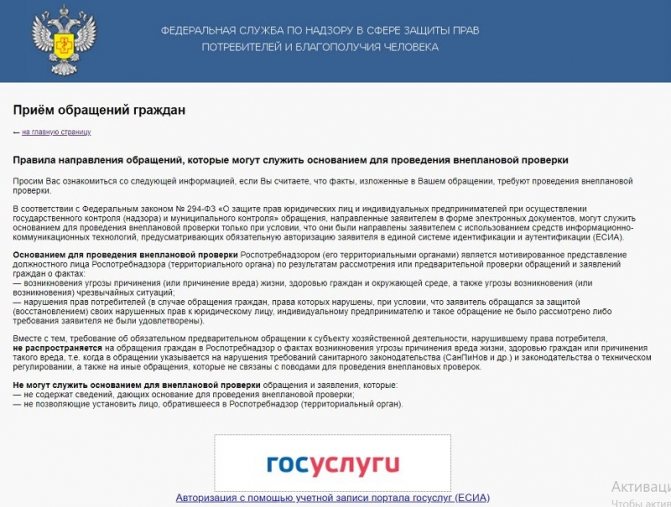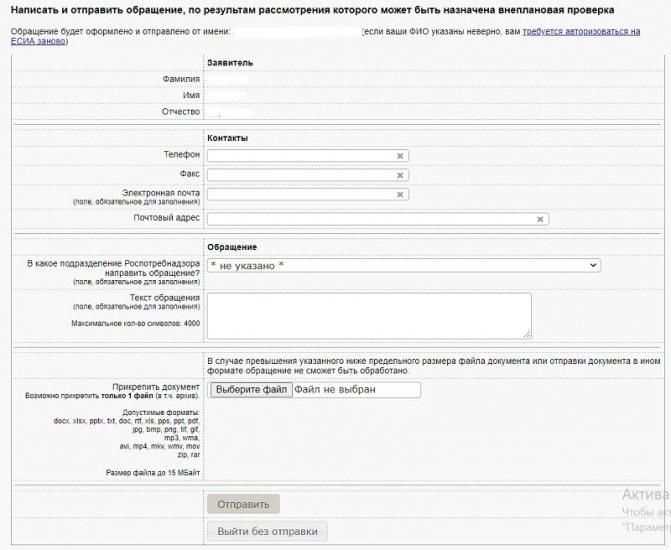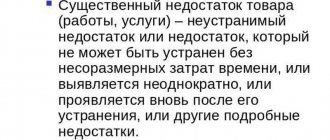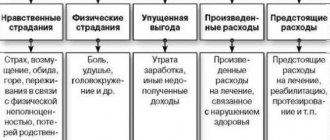Almost every person in his life has encountered low-quality goods or services. The contractor may make a mistake in the work, and the manufacturer may allow the release of a batch of defective goods not due to malicious intent. For example, there could be a glitch on the production line or other human error.
USEFUL : our lawyer for protecting the rights of consumers of goods and services will help you follow the procedure for resolving the conflict: professionally and on time. Call and watch a video on the topic right now
A little theory or what is an STD?
The Law “On the Protection of Consumer Rights” (CRP) regulates the legal relationship between the seller and the consumer.
Seller is an organization or individual entrepreneur that sells products, provides services, and performs work. The law also applies to online stores. It is important that the company or entrepreneur is officially registered. It will not be possible to present legal demands to the grandmother who sold you sour milk at the market “patch” near your house, or to the private owner who erected a crooked fence.
Buyer is an individual who purchases goods/services for himself or his family. Goods used by the buyer in a business are not covered by the provisions of the PPA.
Claim procedure for protecting the rights of consumers of services
Were you sold a low-quality product or provided an inadequate service?
So, let's say you bought a washing machine. For obvious reasons, it was not possible to check its functionality in the store upon purchase. After it was delivered to your home and installed, it turned out that it did not work. What to do in this case?
- The first thing we do is also make a claim. The rules for its presentation have already been discussed.
- Regarding its content, it should be mentioned that it is drawn up in writing, the header indicates the addressee to whom this claim is intended and the applicant is, in fact, you - your full name and address for correspondence. The title of the paper is succinct – claim.
- Next, we set out in detail all the circumstances: when, what, at what price it was purchased. When and by whom it was delivered. When and how did you find out about the problem?
- Well, the petition part specifies the requirements: termination of the purchase and sale agreement with a refund of funds, exchange for a similar product or exchange for another product.
- The seller has 10 days by law to respond to a claim under the Consumer Protection Act.
- If the answer is received and it is positive, I have nothing more to advise as a lawyer. If they offer to submit a product for examination, you must agree. The main thing is to submit it according to the inventory, and the examination in this case will be carried out at the expense of the seller, by the way, watch the video about this in more detail, you will find a video from our channel below.
- If for some reason the response to the claim is negative, or if it is not received within the period established by law, you can begin to prepare a statement of claim for the protection of consumer rights in court.
USEFUL : Watch the video for additional tips on filing a claim.
What you need to know about your rights
By offering the buyer a low-quality product or performing work with defects, the organization violates consumer rights. The law provides for liability for such actions.
Your civil rights are violated if:
- the product sold turned out to be faulty, the service provided does not meet quality requirements, but the seller or service provider does not think so and does not take any steps to meet you;
- the item does not fit in size, does not suit the style, but the seller does not accept your legal refusal of the goods, does not want to make a replacement or return the money;
- the product you purchased was stored in violation of sanitary standards, in inappropriate conditions, which caused health problems;
- You were sold expired products.
Not everyone knows that selling goods without a receipt is not only a gross violation of trade rules, but also infringes on the buyer’s civil rights. Rude treatment and rudeness on the part of the seller is also a violation of consumer rights.
The buyer is obliged to receive a quality product and decent service. Do not be afraid to demand compensation for property or moral damage - on your own or with the help of a lawyer.
Article 4. Law of the Russian Federation “On the Protection of Consumer Rights” - Quality of goods (work, services)
1. The seller (performer) is obliged to transfer to the consumer goods (perform work, provide services), the quality of which corresponds to the contract.
2. If there are no conditions in the contract regarding the quality of the goods (work, service), the seller (performer) is obliged to transfer to the consumer a product (perform work, provide a service) that meets the usually required requirements and is suitable for the purposes for which the product (work, service) of this kind commonly used.
3. If the seller (performer) at the conclusion of the contract was informed by the consumer about the specific purposes of purchasing the goods (performing work, providing services), the seller (performer) is obliged to transfer to the consumer the goods (perform work, provide services) suitable for use in accordance with these goals.
4. When selling a product based on a sample and (or) description, the seller is obliged to transfer to the consumer a product that matches the sample and (or) description.
5. If laws or the procedure established by them provide for mandatory requirements for a product (work, service), the seller (performer) is obliged to transfer to the consumer a product (perform work, provide a service) that meets these requirements.
What to expect in case of violation of consumer rights
An unscrupulous party, having violated your rights, has the opportunity to voluntarily satisfy the claims by offering a choice of:
- exchange low-quality goods;
- reduce the cost of the defective purchase proportionately;
- eliminate deficiencies at your own expense;
- compensate your costs for independently eliminating product defects;
- compensate for losses caused by the sale of low-quality goods;
- terminate the contractual relationship and return the money.
If you have lost your receipt, do not worry - your claims will still be considered.
In a situation where it is difficult to confirm the fact of purchase, you will have to turn to witnesses for help.
Features of consumer protection
Based on the essence of legal relations that arise between entities defined by the Law of the Russian Federation “On the Protection of Consumer Rights,” these are, first of all, civil legal relations. Accordingly, they are regulated by the norms of civil legislation of the Russian Federation. A feature of these legal relations is the presence of a weak consumer subject, which determined a certain focus of all consumer law on establishing a mechanism for protecting the legal rights and interests of the consumer citizen.
Consumer protection is the rules and norms officially established by law and other regulatory documents that protect the consumer, prevent the sale of low-quality goods to him, and compensate for consumer losses from unfair trade.
Based on the name of the Law of the Russian Federation “On the Protection of Consumer Rights,” it can be assumed that it contains rules of law whose purpose is to restore the already violated position of the “weak party” - the consumer.
At the same time, the provisions of the above Law contain more regulatory norms than protective ones, that is, they indicate the rights of the consumer, establish rules relating to the quality of goods, timing of work, provision of services, and the responsibilities of the seller (manufacturer).
In case of violation of consumer rights and negative consequences for him, the Law provides for the responsibility of the manufacturer, producer, seller, service provider to eliminate the shortcomings and compensate for the damage caused, including moral damage.
The legislator regulates the protection of consumer rights as methods of protecting the right established by Article 12 of the Civil Code of the Russian Federation: recognition of the right, restoration of the situation that existed before the violation of the right, and suppression of actions that violate the right or create a threat of its violation, recognition of a voidable transaction as invalid and application of the consequences of its invalidity , application of the consequences of the invalidity of a void transaction, awarding obligations in kind, compensation for losses, collection of penalties, compensation for moral damage, and establishes special rules that apply only to consumers.
Methods of protecting consumer rights are applied taking into account the subject of the attack (health, property interests, life), as well as the consequences that occurred as a result of harm to the consumer.
Scientists distinguish between public defense and judicial defense.
Public protection of consumer rights is the legal protection of the rights of an indefinite number of consumers enshrined in the legislation on consumer protection and includes state and public protection of consumer rights.
State protection is aimed at the formation of consumer policy in general: the development and adoption of regulatory legal acts, the development of programs and concepts aimed at ensuring the protection of consumer rights, improving consumer policy, as well as the creation of authorized bodies that carry out relevant functions in the field of consumer protection.
Public protection can be carried out at the federal level, the level of a constituent entity of the Russian Federation and the municipal level. At the same time, at the municipal level, local government bodies can represent the interests of citizens in court, consider consumer complaints, and advise them.
Provisions on public protection as one of the types of public protection are contained in Article 45 of the Law of the Russian Federation “On the Protection of Consumer Rights” and it is carried out by public associations of consumers (their associations, unions), whose activities are aimed at both the formation of proposals for improving legislation and interaction with international organizations consumers, as well as specific actions to protect consumer rights, including representing their interests in the courts. In the conditions of developed integration, approaches to the issues of protecting consumer rights of the countries of the European Union and the Eurasian Community are of significant interest. Thus, the Board of the Eurasian Economic Commission developed recommendations dated May 21, 2020 No. 15 “On general approaches to establishing special measures to protect the rights and interests of certain categories of consumers,” in which it recommends that member states of the Eurasian Economic Commission carry out activities on legal regulation in the field of protection consumer rights take into account General approaches to establishing special measures to protect the rights and interests of certain categories of consumers. The purpose of these recommendations is the need to implement special measures to protect the rights and interests of certain categories of consumers, due to their age, physical and mental characteristics, which affect the ability to adequately assess the consequences of a transaction, leading to the emergence of consumer risk associated with increased consumer damage.
Any civilized state should be focused on protecting the rights and interests of citizens and determine special measures for certain categories of consumers.
The Law “On Protection of Consumer Rights” provides for the possibility of protecting consumer rights both in court and out of court. The essence of the out-of-court procedure is that the consumer has the right, and sometimes the obligation, to present demands for the protection of a violated right directly to the seller (manufacturer, performer), before filing a claim in court. This procedure is provided in order to encourage the parties to independently resolve the disagreements that have arisen, and the seller (manufacturer, performer) to satisfy the consumer’s demands on a voluntary basis, thereby providing the opportunity to restore the violated right.
In certain cases, the consumer, before filing a corresponding statement of claim in court, must go through the stage of pre-trial (claim) resolution of the dispute with the contractor. Claims proceedings have a number of advantages over litigation. This proceeding allows you to quickly and without additional costs (payment for the services of a representative, conducting a forensic examination, etc.) determine the circumstances of the dispute and, if necessary, take measures to restore the violated rights of the consumer. The law provides for a mandatory pre-trial procedure for resolving disputes in the field of consumer protection. Yes, Art. 122 of the Federal Law of January 10, 2003 No. 18 “Charter of Railway Transport of the Russian Federation” provides that the procedure for submitting and considering claims of senders and recipients is established by the rules for the provision of services for the transportation of passengers, luggage, cargo luggage by rail. Based on clause 68 of the Government of the Russian Federation of March 2, 2005 No. 111 “On approval of the Rules for the provision of services for the transportation of passengers by rail, as well as cargo, luggage and cargo luggage for personal, family, household and other needs not related to the implementation of entrepreneurial activity" before filing a claim against the carrier arising in connection with the transportation of passengers, luggage, cargo luggage, a claim may be filed against the carrier in the event of loss, shortage or damage (spoilage) of luggage, cargo luggage within six months, and in case of delay in delivery luggage and cargo luggage, delays in departure or train delays - within 45 days. The legislation also provides for other cases of mandatory pre-trial dispute resolution.
Many legal disputes require pre-trial settlement, but as a rule, based on practice, most disputes are still resolved in court.
The right to judicial protection is provided, first of all, by the Constitution of the Russian Federation, as well as by the norms of civil legislation and the Law of the Russian Federation “On the Protection of Consumer Rights”.
There are procedural features of consideration of cases on the protection of consumer rights, regarding which the Plenum of the Supreme Court of the Russian Federation expressed its position in Resolution No. 17 dated June 28, 2012.
The legislation does not establish special limitation periods for cases of consumer protection. According to jurisdiction, cases on the protection of consumer rights are considered by courts of general jurisdiction, despite the fact that one of the parties is a legal entity and an individual entrepreneur.
Taking into account the peculiarities of the status of subjects of legal relations in the field of consumer rights protection (for example, a claim is brought against the manufacturer of a product and the defendant is registered and located in another city), the law establishes alternative jurisdiction, according to which the parties can, by agreement among themselves, agree to change the territorial jurisdiction; if there are several defendants in a consumer protection case or are located in different places, the plaintiff has the right to choose to file a claim at the location of one of the defendants. Another significant benefit for the consumer is his exemption from paying state duties in accordance with the legislation of the Russian Federation on taxes and fees if the cost of the claim does not exceed 1,000,000 rubles when filing a claim in court.
In addition, by virtue of Article 46 of the Law “On Protection of Consumer Rights”, the state supervisory authority, local government bodies, public associations of consumers (their associations, unions) can apply for the termination of illegal actions of the manufacturer (performer, seller, authorized organization or authorized individual entrepreneur, importer) in relation to an indefinite number of consumers.
One of the ways to restore a violated right is to restore the violated right by:
– elimination of product defects by the manufacturer (seller, authorized organization or authorized individual entrepreneur, importer);
– replacement of goods of inadequate quality;
– requirements for a proportionate reduction in the purchase price;
– demands for immediate free elimination of defects in the goods or reimbursement of costs for their correction by the consumer or a third party;
– refusal to execute the purchase and sale agreement.
Both in court and in pre-trial proceedings, the consumer can demand payment of a penalty for violation of deadlines, as well as for failure to fulfill (delay in fulfillment) the consumer’s request to provide him with a similar product for the period of repair (replacement). At the same time, the amount of the penalty is established by the Law of the Russian Federation “On the Protection of Consumer Rights”.
Also, the Law of the Russian Federation “On the Protection of Consumer Rights” provides for the seller’s liability for violations under the agreement for the transfer of goods to a prepaid person. In this case, the consumer has the right to demand the transfer of the paid goods within the new time frame established by him, to collect the amount of the penalty (penalty) for each day of delay before the transfer of the goods, or has the right to demand the return of the amount of advance payment for goods not sold by the seller.
The population's needs for various services and goods are provided by trade, manufacturers, and performers of work and services. However, being the stronger party in contractual relations, they impose on consumers conditions for the purchase of goods and services that are beneficial only to themselves. At the same time, there are often cases when goods are of low quality and sometimes are simply dangerous to health.
In this regard, the legislator has provided for various ways to protect the rights of the consumer, depending on the subject of the attack, the degree of harm caused, leaving behind the right to choose the method of compensation for the harm caused or elimination of shortcomings.
Literature:
- Constitution of the Russian Federation (adopted by popular vote on December 12, 1993, taking into account amendments made on July 21, 2014) // Rossiyskaya Gazeta. No. 237. 1993.
- Civil Code of the Russian Federation // “Collection of Legislation of the Russian Federation”, 05.12.1994, No. 32, Art. 3301, “Rossiyskaya Gazeta”, No. 238–239, 12/08/1994.
- Law of the Russian Federation “On the Protection of Consumer Rights” // “Collection of Legislation of the Russian Federation”, 01/15/1996, No. 3, Art. 140, “Rossiyskaya Gazeta”, No. 8, 01/16/1996.
- Federal Law “Charter of Railway Transport of the Russian Federation” dated January 10, 2003, No. 18.
- Decree of the Government of the Russian Federation “On approval of the Rules for the provision of services for the transportation of passengers by rail, as well as cargo, luggage and cargo luggage for personal, family, household and other needs not related to business activities” dated 03/02/2005, No. 111.
- Resolution of the Plenum of the Supreme Court of the Russian Federation dated March 24, 2020 No. 7 “On the application by courts of certain provisions of the Civil Code of the Russian Federation on liability for violation of obligations” // Bulletin of the Supreme Court of the Russian Federation. 2020. No. 5.
- Resolution of the Plenum of the Supreme Court of the Russian Federation dated June 28, 2012 No. 17 “On the consideration by courts of civil cases in disputes regarding the protection of consumer rights” // Bulletin of the Supreme Court of the Russian Federation. 2012. N 9.
- Determination No. 85-B09–1 // Review of the Supreme Court of the Russian Federation on certain issues of judicial practice on the application of legislation on the protection of consumer rights in civil cases dated February 1, 2012.
- Resolution of the Plenum of the Supreme Court of the Russian Federation dated June 23, 2020 No. 25 “On the application by courts of certain provisions of Section I of Part One of the Civil Code of the Russian Federation.”
- Resolution of the Plenum of the Supreme Court of the Russian Federation dated June 28, 2012 No. 17 “On the consideration by courts of civil cases in disputes regarding the protection of consumer rights” // Bulletin of the Supreme Court of the Russian Federation. 2012. No. 7.
- Ozhegova G. A. Legal regulation of compensation for losses // Lawyer. 2020. No. 12. pp. 13–16.
- Stoyakin G. Ya. The concept of protection of civil rights // Problems of civil liability and protection of civil rights: Collection of scientific works. 1973. No. 27.
- Raizberg B. A., Lozovsky L. Sh., Starodubtseva E. B. “Modern economic dictionary. — 6th ed., revised. and additional - M." (INFRA-M, 2011)
Where are violated rights restored - where to go?
Quality control of the sale of goods and provision of services is carried out by the following structures:
- Rospotrebnadzor and its territorial departments;
- sanitary and epidemiological institutions;
- courts;
- prosecutor's office
It is to these trade market control authorities that statements or complaints are sent if consumer rights are violated. In addition, you can contact the police, local administration, consumer rights protection societies, relevant authorities (Housing Inspectorate, Roskomnadzor, Department of Health).
Product quality
The concept of product quality is included in a separate article of the law on the protection of consumer rights:
Article 4. Quality of goods (work, services)
1. The seller (performer) is obliged to transfer to the consumer goods (perform work, provide services), the quality of which corresponds to the contract.
2. If there are no conditions in the contract regarding the quality of the goods (work, service), the seller (performer) is obliged to transfer to the consumer a product (perform work, provide a service) that meets the usually required requirements and is suitable for the purposes for which the product (work, service) of this kind commonly used.
3. If the seller (performer) at the conclusion of the contract was informed by the consumer about the specific purposes of purchasing the goods (performing work, providing services), the seller (performer) is obliged to transfer to the consumer the goods (perform work, provide services) suitable for use in accordance with these goals.
4. When selling a product based on a sample and (or) description, the seller is obliged to transfer to the consumer a product that matches the sample and (or) description.
5. If laws or the procedure established by them provide for mandatory requirements for a product (work, service), the seller (performer) is obliged to transfer to the consumer a product (perform work, provide a service) that meets these requirements.
If you carefully read the above excerpt from the law, you can understand that all the conditions listed in it have already been listed above when considering the concept of “defect of goods”.
Thus, we can conclude that the quality of a product is determined by its absence of defects. If there is a defect, then the product is of poor quality.
Claim
So, the seller is not going to accept the expired product back and refuses to return the money. Don’t give up - make a written complaint: with a brief statement of the facts of the precedent, the desired method and time frame for resolving the problem. You will need two copies: give one to the seller, the other with an acceptance note, keep it for yourself. Attach copies of receipts, receipts, and warranty cards.
If the store does not accept the application, send certified mail with notification. Take your overdue purchase to Rospotrebnadzor and file a complaint there.
The deadline for consideration of a claim is 10 calendar days. If during this time you do not receive an answer, or it does not meet your expectations, contact the court.
Types of consumer protection methods
Salamov Viskhan Nashakhoevich 4th year student of the jurisprudence faculty of the Federal State Budgetary Educational Institution of Higher Education Chechen State University of Grozny
Civil legislation, in addition to recognizing individual rights, also provides for their protection. Traditionally, in the legal literature, the concept of “protection of civil rights” is understood as a whole set of measures (political, legal, economic, including organizational), which guarantees the normal exercise of rights and provides conditions for the exercise of subjective rights.
The protection of rights in the narrow sense is called the protection of civil rights. Thus, the protection of rights is the most important category of civil law. In fact, the protection of rights is an activity aimed at suppressing actions that violate rights and restoring rights that have already been violated. In a general sense, these actions can be defined as the application of law enforcement measures by an authorized person aimed at restoring violated or disputed rights.
It should be noted the multidimensional nature and complexity of such a phenomenon as the right to protection, which gives rise to different points of view regarding the concept. Often the presence of ambiguous terminological approaches is due to both the tasks set by the researcher and different interpretations of the same term.
Scientists do not have a common opinion in the discussion about the nature and content of the right to protection today. Opinions about whether this right is an independent subjective right, or the right to defense is an element of subjective civil law.
The scientific literature has repeatedly pointed out the close connection between “protection” and “responsibility”
One of the reasons for the protection of rights and the basis for liability is an offense. The purpose of protecting rights is to restore the previous property position of the creditor in the obligation. In addition to rehabilitation, the defense must neutralize the harmful consequences of the crime. To perform the functions of restoration and neutralization, the protection of rights must have means in the form of protection methods.
As we saw above, civil liability is also a special condition that reflects the negative consequences that arise on the creditor's side of the obligation and focuses on the goal of restoring the creditor's previous property. Civil liability carries out the restoration of previous property through means that are measures of liability.
Thus, restoration of property status is both a method of protection for the entitled person and a consequence of the application of civil liability measures. If it is impossible to restore the previous situation, compensation for the damage caused is provided.
An analysis of current legislation also shows that the concept of “protection”, as a rule, is associated with the legislator violating the law. In particular, consumers receive real protection of rights and legitimate interests after their violation.
One of the traditional means of protecting consumer rights is the ability to recognize the terms of an agreement as violating consumer rights - this condition is invalid and is the basis for prosecution, which leads to judicial practice - much attention is paid to this problem. Consulting services, being a kind of “information services,” do not have legal fixation, which leads not only to the difficulty of classifying these services, but also to challenging the terms of contracts for consulting services.
Means for protecting civil rights and interests protected by law, as a rule, are:
• pre-trial dispute resolution, which provides for an independent voluntary dispute resolution procedure that allows for a short-term restoration of the violated right;
• judicial procedure for resolving disputes related to the plaintiff's appeal to the court, requiring justice with material demands from the defendant to fulfill contractual or non-contractual obligations.
According to Russian civil law, the protection of violated consumer rights can be carried out by the court.
The Law “On Protection of Consumer Rights” establishes alternative jurisdiction for cases of consumer protection. This means that the consumer, at his own discretion, chooses the court in which the lawsuit is brought: the court at the location of the organization, and if the defendant is an individual entrepreneur, at his place of residence; at the place of residence or stay of the plaintiff; at the place of conclusion or execution of the contract;
As a general rule, in accordance with Article 17 of the Law “On the Protection of Consumer Rights”, as well as Article 333.36 of the Tax Code of the Russian Federation, plaintiffs in claims for the protection of consumer rights are exempt from paying state fees.
The consumer can bring a claim to the court himself (in person) or through a representative.
Complaint to Rospotrebnadzor
The body controls the quality of goods and services, checks the public catering sector, the activities of medical institutions and all organizations providing services - hotels, cafes, pharmacies, airports.
Before seeking protection from Rospotrebnadzor, the law requires you to contact the organization where the unpleasant incident occurred with a written complaint. If an unscrupulous party ignores your demands, feel free to prepare a complaint.
The application must not be anonymous and excludes false information.
There are five ways to complain to Rospotrebnadzor:
- Personal visit to the territorial department at your place of residence.
- Sending a complaint by registered mail via Russian Post.
- Electronic appeal via the Internet.
- Written complaint via courier service.
- Electronic complaint through the official website of Rospotrebnadzor.
One of two options for a complaint to Rospotrebnadzor will lead to an unscheduled inspection of the organization or individual entrepreneur. In this case, you must have an account on the State Services portal.

It should be noted that a complaint requiring an unscheduled inspection of an organization is appropriate if there is a real threat of an emergency or harm to human health.

If you prefer the method of submitting an application without authorization on the State Services portal, an unscheduled inspection of the organization or individual entrepreneur by Rospotrebnadzor will not be initiated.
Consumer rights
CONSUMER'S RIGHT TO THE QUALITY OF GOODS, WORK OR SERVICES.
The consumer’s right to the quality of a product (work, service) obliges the seller (performer) to ensure the quality of everything that he sells to the consumer in accordance with the contract. If the quality of goods (work, services) is not specifically specified by the parties, they, at a minimum, must be suitable for use for their usual purpose. If the seller (performer) at the conclusion of the contract was informed by the consumer about the specific purposes of purchasing the goods (performing work, providing a service), the seller (performer) is obliged to transfer to the consumer the goods (perform work, provide a service) suitable for use in accordance with these purposes . The consumer has the opportunity to further specify his needs by including in the contract the condition for the provision of goods according to a sample or description. The seller is obliged to fulfill this condition. If the standard provides for mandatory requirements for the quality of a product (work, service), the seller (performer) is obliged to transfer to the consumer a product (perform work, provide a service) that meets these requirements. The mandatory requirements for the quality of goods (work, services) from the general list only include the requirement for the safety of goods (work, services) for the environment, life, health and property of people. Products subject to mandatory certification must have safety requirements; the list of goods subject to mandatory certification is approved by the Government of the Russian Federation. In accordance with paragraph 3 of Art. 474 of the Civil Code of the Russian Federation, if the law, other legal acts, mandatory requirements of state standards or the purchase and sale agreement provide for the seller’s obligation to check the quality of the goods transferred to the buyer (testing, analysis, inspection, etc.), the seller is obliged to provide the buyer with evidence of the quality check goods. The concept of quality of goods (works, services) includes not only the useful properties of the product, but also the period during which these useful properties are preserved. The period during which the manufacturer (performer) undertakes to provide the consumer with the opportunity to use the product for its intended purpose and bear responsibility for significant deficiencies is the service life. The manufacturer sets it based on his own considerations, and can choose for this both a time frame (for example, 5 years) and other units of measurement (for example, car mileage in kilometers). But in any case, establishing the service life is the responsibility of the manufacturer. Whatever the deadline, it must be established, and not only for the product as a whole, but also for components, components, assemblies, which during operation may, having lost their useful properties, after a certain time begin to pose a danger to life and health , property, consumer habitat. The manufacturer is obliged throughout the entire service life to ensure the possibility of repair and maintenance of the product, supply to trade and repair organizations in the required range and volume of spare parts during the entire period of production of the product and after its removal from production during the service life of the product, and in the absence of such term - within 10 years from the date of transfer of the goods to the consumer. For food products, perfumes and cosmetics, medicines, household chemicals and other similar goods (work), the manufacturer sets not a service life, but an expiration date - the period after which the product (work) is considered unsuitable for its intended use. The sale of goods with unknown or expired shelf life or service life is prohibited. If establishing the service life or shelf life of a product is the responsibility of the manufacturer, then determining the warranty period is his right. During this period, the manufacturer (performer) must satisfy the consumer’s demands free of charge to eliminate the defects in the quality of the product discovered by him. The rights of the consumer and the obligations of the seller (manufacturer, performer) in such cases are regulated by the contract (warranty card). In this case, the seller has the right to establish an additional warranty period for the product beyond the manufacturer’s warranty or an additional warranty period established by law.
If the case goes to court
Appeal to the court with a corresponding claim is provided for in Art. 11 of the Civil Code of the Russian Federation.
The choice of court is made by the plaintiff.
Guided by Art. 17 of the PPA, you can bring a claim at the place:
— location of the organization or place of residence of the individual entrepreneur;
— your residence (stay);
— conclusion or execution of a contract.
There is no state fee for consideration of civil claims in the field of consumer rights protection.
When going to court, you have the right to expect additional payments from the defendant for refusing to voluntarily resolve the problem: compensation for moral damage and payment of a penalty.
General characteristics of the form and methods of protecting consumer rights
As already noted, the problem of civil law methods of protecting consumer rights and the effectiveness of their application in practice is not new for Russian legal science, but the theoretical and practical aspects of this issue are not sufficiently covered in the legal literature. Methods of protection are a set of measures used to ensure the free exercise of subjective rights.
Art. 12 of the Civil Code of the Russian Federation provides for 12 ways to protect civil rights. Compared to the Civil Code of the RSFSR of 1964 (hereinafter referred to as the Civil Code of the RSFSR), the list of these methods has expanded significantly, although there are only two innovations: for the first time, self-defense of civil rights and compensation for moral damage are enshrined at the legislative level. Most likely, the introduction of new methods of protecting the rights of citizens and the detailing of old ones were due to the transition from mass values to individualistic ones, which are based on the rights, freedoms and interests of the individual.
The adoption of the Law “On the Protection of Consumer Rights” brought to the fore the need to improve the civil law mechanism for protecting consumer rights. For many years, the consumer was virtually deprived of the opportunity to protect his rights. The current Civil Code of the RSFSR did not prevent the consumer from going to court in the event of a violation of his rights by an unscrupulous seller (manufacturer, performer). However, at that time there was no universal mechanism for protecting consumer rights.
The list specified in Art. 12 of the Civil Code of the Russian Federation is not exhaustive, since it is possible to use other methods, provided that this is provided for by law.
Article 9 of the Federal Law “On the entry into force of Part Two of the Civil Code of the Russian Federation” provides: “in cases where one of the parties to the obligation is a citizen using, purchasing, ordering or intending to purchase or order goods (work, services) for personal household needs , such a citizen enjoys the rights of a party to an obligation in accordance with the Civil Code of the Russian Federation, as well as the rights granted to the consumer by the Law of the Russian Federation “On the Protection of Consumer Rights” and other legal acts issued in accordance with it.” Thus, the buyer-citizen, purchasing goods under a retail purchase and sale agreement, has additional (compared to the buyer-organization) opportunities to ensure and protect his rights and legitimate interests provided to him by the legislation on the protection of consumer rights.
Currently, to protect consumer rights, the legislation uses five civil legal methods of protection - self-defense of rights, change or termination of legal relationships, compensation for losses, collection of penalties and compensation for moral damages.
Each of these methods is successfully used in the implementation of consumer rights protection, which is confirmed by judicial practice and the practice of public organizations and local government bodies (hereinafter referred to as CHI). The peculiarity of methods of protecting consumer rights is that in each specific situation they can be applied individually or all together. For example, when terminating a retail purchase and sale agreement in court, the consumer, as a rule, in a statement of claim demands not only the termination of the legal relationship, but also the recovery of losses, penalties and compensation for moral damage.
From the moment the seller (performer) violates the rights of a particular consumer, the latter is faced with the question of choosing a form of protection. A form of protection of rights is a set of special procedures regulated by law, carried out by law enforcement agencies and the authorized person himself within the framework of the human rights process and aimed at restoring (confirming) the violated (challenged) right. Citizens have a real opportunity to defend their rights both in court and out of court.
The consumer is given the right to independently choose both the form and the specific method of protection, based only on his inner conviction of the effectiveness and correctness of the choice.
In the following paragraphs we will consider the procedure and methods for protecting consumer rights.
Ways to protect consumer rights







